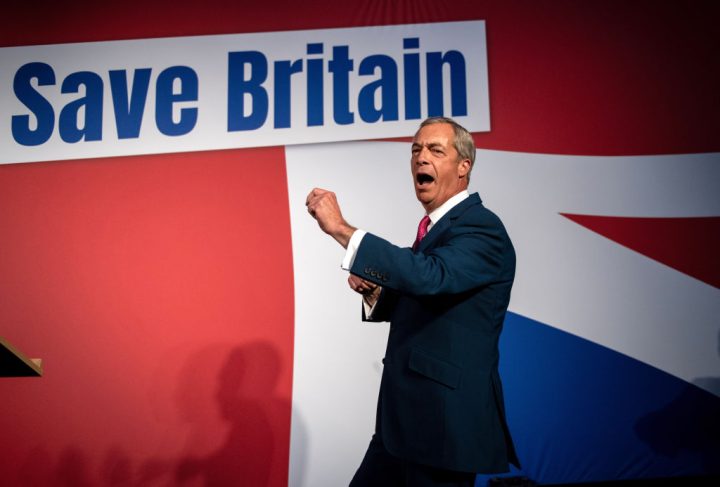For the third time in recent years a party created by Nigel Farage is threatening the Tory party’s fading hopes of re-election. But this time the Tories’ very existence is at stake.
Reform UK was founded in 2018 by Farage from the ashes of Ukip – which forced David Cameron to call and lose the 2016 EU referendum – and from the Brexit party, which destroyed Theresa May after she tried to backslide on Brexit. Now the party is in third place in opinion polls and may turn the Tories’ expected defeat at this year’s election into an extinction event.
The Tories are so detested that true conservatives will vote for Reform anyway
Ironically, at a time when the rest of Europe is turning to the hard right over the immigration issue, Britain looks set to hand the left-wing Labour party its biggest ever electoral victory – and reduce the Tories to a parliamentary rump. That defeat may become a rout and spell the death of the Tories, if Reform fulfils its promise to stand in all 650 seats and siphon off the votes of disillusioned Conservatives who would otherwise reluctantly support Rishi Sunak (whose own previously safe seat may even be at risk).
True to form, the complacent Tories have taken their time to wake up to the extent of the looming threat on their right. But last week’s bitter attacks on Reform’s leader Richard Tice as a ‘bully’ by Tory chairman Richard Holden, and the rather desperate attempt to smear some Reform candidates as extremists shows that, at last, the Tories realise their future is on the line.
It is therefore high time to take a closer look at the insurgent outfit that may end the Tories’ two century reign as Britain’s natural party of government. We should ask whether Reform is a genuine new force in politics or merely a spoiler ‘pop-up party’ destined to follow its two predecessors and disappear into oblivion once it has served its purpose and punished the Tories by consigning them to history.
Unlike Ukip, both the Brexit party and Reform aren’t conventional political parties in the traditional sense: they don’t have local party branches and their candidates and officials are appointed by party HQ rather than chosen by local members. Reform is registered at Companies House as a company with Nigel Farage and Richard Tice listed as directors. It is a top down rather than a grassroots party and its policies are decided on and dictated from above. Party democracy is conspicuous by its absence.
Of course the same is true of the two major parties, which use their paying members as cash cows and envelope stuffers rather than policy deciders. But a party sworn to reform British democracy should surely be different from the rotten system it seeks to replace.
Another major difference to Ukip is that Nigel Farage is not the party leader of Reform but merely its honorary president. The man who spent more than twenty years stomping the country to get Britain out of the EU turns 60 this week and is showing a marked reluctance to descend into the arena again to get involved in the mucky business of day-to-day politics – even though his undoubted charisma would boost Reform to around 20 percentage points according to polls. Instead, Tice is keeping Nigel’s seat warm while he decides on his future.
So far, Farage evidently, and understandably, prefers presenting his popular and lucrative TV show on GB News to the thankless task of building yet another party and facing the abuse and calumnies of the many who loathe his politics. Much of his time as Ukip leader was spent dealing with petty factional fights among its officials, and weeding out the weirdos who infested the organisation. It’s no surprise that he doesn’t feel keen to go back to that.
I know whereof I write as I was a Ukip candidate in the 2014 European parliamentary elections when the party topped the polls. At the general election the following year I stood for Ukip in Eastbourne, coming third in a field of six, and beating both Labour and the Greens.
That 2015 election was Ukip’s high water mark, compelling Cameron to fulfil his pledge to hold the Brexit referendum. It also starkly demonstrated the flaw in Britain’s first-past-the-post electoral system: almost four million people voted for Ukip, yet the party won just a single seat – Douglas Carswell in Clacton.
The same thing may happen this year: Reform may well rack up millions of votes without gaining any seats. This time round however, the Tories have so little to offer that many conservatives will vote for Reform anyway – with or without Farage – just to get shot of them for good.






Comments